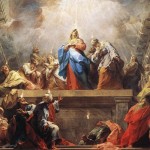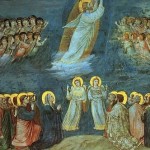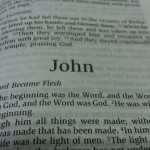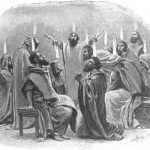Why Should We Care About Pentecost?
A few weeks ago, the church (and some who are not part of the church) celebrated the resurrection of Jesus Christ. Over the last few days, I’m published a few posts that deal with some of the events in Acts following his resurrection: “The Ascension of Jesus Christ,” “What is Pentecost,” and “The Day of Pentecost in the Upper Room.”
For many believers, it’s easy to understand the significance of the Jesus death, burial, and resurrection. But, why should we care about Pentecost?
About fifty days after Jesus was crucified and about 10 days after he ascended into heaven, God the Father sent the Holy Spirit to indwell his children. While the Spirit had been at work in the lives of people before that, that work seems to have always been temporary. But, in this case, the Spirit indwelled the people of God and remained with them.
On that first Pentecost (from a Christian perspective), the Spirit indwelled 120 followers of Jesus. They all began to demonstrate that the Spirit had indwelled them primarily by speaking in tongues. The people who witnessed this heard all of the people speaking in different language. But, it seems that everyone heard someone speaking their own language.
Some thought Jesus’ disciples were drunk. Peter explained to them that they were not drunk. Instead, he said, they were the recipients of the Spirit of God which had been promised by the prophets many, many years earlier. Peter briefly explained to them the significance of Jesus’ death, burial, and resurrection, and called them to repentance. According to Luke, three thousand people repented, were baptized, and became part of God’s family that day.
This sounds amazing. This sounds wonderful. This is definitely a mighty work of the Holy Spirit.
But, if we begin to think that this alone is the importance of the Day of Pentecost, then we misunderstand the importance of the indwelling of the Holy Spirit. God’s own Spirit lives within his children. He communicates with us through his Spirit. He strengthens and encourages us through his Spirit. He guides us through his Spirit. He gives us gifts for the benefit of the church through his Spirit. I could go on and on and on.
And, these are not one time occurrences. God is constantly with us and working in us and working through us and changing us and revealing to us and exhorting us and comforting us… all of these through his Spirit. This is the amazement and glory of Pentecost: not that the Spirit came down one day and did mighty works in and through Jesus’ followers, but that the Spirit remains with us every day and continues to do mighty works in and through Jesus’ followers.
All of the commands and examples and principles in Scripture would be impossible without the Spirit’s presence, empowerment, and enablement. But with God – that is, with his Spirit – we are able to live in manner that honors him, that brings him glory, and that is worthy of the gospel of Jesus Christ.
Pentecost was amazing… and the ramifications of that day continue within us and continue to be amazing.
The Ascension of Jesus Christ
According to the Book of Acts, about forty days after Jesus’ resurrection and a little over a week before Pentecost (the day the Holy Spirit indwelled those 120 believers), Jesus ascended into heaven. Luke says that Jesus rose up into the sky until his followers could no longer see him. (Acts 1:9)
The church often talks about the importance of the resurrection. And, we understand the importance of Pentecost, even if we don’t talk about it quite as much. But, what about the ascension of Jesus? Is it important? Or is it just a blip in the history of the church?
In fact, according to Jesus himself, his ascension is very important.
Several times, Jesus told his followers that he would be returning to his Father. Of course, they probably didn’t understand exactly what he meant when he said that (as demonstrated by their question in Acts 1:6.
Throughout John 14, for example, Jesus tells his followers three times that he is going to the Father. (John 14:2-3, John 14:12, John 14:28) Furthermore, in that same passage, Jesus tells them that he is going away (although not specifically “to the Father”) in John 14:18.
In this passage, while Jesus is talking about going away to the Father, he also continues to instruct his followers about another important event: The Father is sending the Holy Spirit to dwell in his children. The two events seem to be interrelated in John 14.
In John 14:16, Jesus said that he will ask the Father (while he is with him) and the Father will give them the Holy Spirit. In John 14:26, again Jesus said that the Father will send the Holy Spirit to them.
But, while the connection between Jesus going away to the Father and the sending of the Holy Spirit seem related in John 14, Jesus does not directly specify that there is a relationship between the two events. However, when we get to John 16, Jesus specifically says that the sending of the Holy Spirit is directly related to his going to the Father:
I did not say these things to you from the beginning, because I was with you. But now I am going to him who sent me, and none of you asks me, ‘Where are you going?’ But because I have said these things to you, sorrow has filled your heart. Nevertheless, I tell you the truth: it is to your advantage that I go away, for if I do not go away, the Helper will not come to you. But if I go, I will send him to you. (John 16:4-7)
In this passage, Jesus not only connects the sending of the Holy Spirit (“Helper” in the ESV translates a word that Jesus used for the Holy Spirit earlier in John 14:16) when he goes to the Father, but he tells his followers that it is better for him to go away so that the Holy Spirit could come.
While we could speculate, Jesus does not explain why he has to go away for the Holy Spirit to come. However, it seems clear from the passage above that the two events are related. So, without the ascension of Jesus, there would be no Day of Pentecost. If Jesus did not go away to the Father (and leave his followers for about a week), then the church today would not be indwelled by the Holy Spirit.
According to Jesus, it is better for us today that we are indwelled by the Holy Spirit than for Jesus to walk among us physically. As we look back on the time when the church celebrates the resurrection of Jesus and forward to the time when the church celebrates the coming of the Holy Spirit, let’s not forget that Jesus ascended, so that the Holy Spirit could come.
Where’s my super suit?
You know that scene from the animated “The Incredibles” right? It’s one of my favorite scenes of all time.
Lucius (a friend of Bob Parr a.k.a. Mr. Incredible) is preparing to come out of retirement as Frozone to battle the evil Syndrome.
But, there’s one problem. He has a date with his wife Honey. Here’s the dialog from the scene:
Lucius: Honey?
Honey: What?
Lucius: Where’s my super suit?
Honey: What?
Lucius: Where – is – my – super – suit?
Honey: I, uh, put it away.
[helicopter explodes outside]
Lucius: *Where*?
Honey: *Why* do you *need* to know?
Lucius: I need it!
Lucius had been living as a normal person. But, now that there was trouble and he felt needed, he was ready to jump into action as the superhero Frozone. (Of course, Honey had other plans.)
But, I think many Christians live life like Frozone. No, not as superheros in hiding… although, it is something like that.
Instead, they think that God cannot and will not use them unless everything is just right: they’ve had their “daily quite time” or they’ve been reading Scripture regularly or they’ve attended the right kind and right number of church meetings or they’ve had a certain amount of education and training or they hold a certain position in the church.
Nothing could be further from the truth. For those of us who are God’s children (that is, we’re saved and indwelled by the Holy Spirit), then God is ready, willing, and able to work in and through us in a variety of ways.
God is not waiting for us to find our “super suit.” Instead, he’s waiting for us to begin working to serve others so that he can then work through us.
What? God is waiting for us to work? Yes. God works through the efforts of his children. While studying Colossians, I saw this clearly in the following statement that Paul made about his own work for the gospel and for the church:
For this I toil, struggling with all his energy that he powerfully works within me. (Colossians 1:29 ESV)
Paul is working hard, but as he works he finds that God is providing the energy he needs to get the work done. I think the same concept can be found in other parts of Scripture as well.
There are no “super” Christians. There are followers of Christ who are working for others, and there are those who are not working for others. There are Christians who are love God by loving others, and there are those who are not loving God or others. There are believers who are serving through the gifts that the Spirit has given, and there are those who choose not to use their gifts to serve others.
Stop looking for or waiting for your super suit. As I’ve told many people: God is able to more through you than you think (regardless of what you think).
So, start serving others (working hard or toiling at serving others) and give God a chance to empower you as well.
Mutual edification in Romans?
But, I thought Romans was a theology book?
Well, my friend Jason from “Second and Content” wrote about “Mutual Encouragement [in] Romans 1:8-15.” You may remember Jason from the videos interviews that we’ve been doing (see part 1 and part 2 – we’re hoping to tape part 3 this weekend).
According to Jason, Paul begins his letter to the Romans with a desire to get together with them so that they can all mutually encourage one another. Of course, Jason gets that from this sentence in Paul’s opening section:
For I long to see you, that I may impart to you some spiritual gift to strengthen you -Â that is, that we may be mutually encouraged by each other’s faith, both yours and mine. (Romans 1:11-12 ESV)
Wow… Paul was expecting these Roman Christians to encourage him, just as he was expecting to be an encouragement to them. Paul? The great theologian and missiologist? How could someone have anything to offer him?
Well, because Paul knew that those Roman Christians were indwelled by the Holy Spirit, just like Paul was. That is the only ingredient necessary for mutual edification, assuming of course that we don’t get in the Spirit’s way.
Read Jason’s post. He also of really good things to say.\
(By the way, congratulations to Jason on graduating from college today!)
The Holy Spirit in John
So far, I’ve looked at what the authors of Matthew, Mark, and Luke wrote about the Holy Spirit. In this post, I’m going to look at the information in the Gospel of John about the Holy Spirit.
As in the Synoptic Gospels, John tells us that John the Baptist saw the Holy Spirit descend on Jesus like a dove (John 1:32), and that John the Baptist contrasted his own water baptism with Jesus’ Spirit baptism (John 1:33).
Jesus tells Nicodemus that those born (born again or born from above) of the Holy Spirit are spirit (spiritual people? care about spiritual things?) (John 3:6). Also, he tells Nicodemus that the Spirit’s work is similar to the wind, in that you can’t see it, but you can tell that the Spirit is present and working (John 3:8). In the same context, John states that God gave the Spirit “without measure” to Jesus (the one whom God sent) (John 3:34).
John states that the Holy Spirit gives life (it is also implied that this same “life” is available to those who believe in Jesus) (John 6:63). He also compared receiving the Spirit to having “rivers of living water” flowing out of the innermost being. According to John, this Spirit (rivers of living water) would eventually be given to those who believe in him (future tense for the narrative time, but past tense for the author) (John 7:39).
There is much about the Spirit in John chapters 14-16. The Spirit is called “the Spirit of truth” and “the Helper” and is again promised to come and dwell with them (John 14:17). The Spirit (who is sent by the Father in Jesus’ name) will teach them all things and help them remember things (John 14:26). Similarly, John writes that Jesus will send the Spirit, who will testify about Jesus (John 15:26). Jesus says that it is better for him to go away (physically) so that the Holy Spirit (“Helper”) could come (John 16:7). John then says that the Spirit will convict the world of (or bring to light for the world) sin, righteousness, and judgment (John 16:8-11). We also learn that the Spirit does not speak of his own authority (much like Jesus said of himself), but will instead speak what he hears (“from God” is assumed) (John 16:13).
Then, at the end of John, we see Jesus breathing on his disciples and giving them the Holy Spirit (John 20:22).
In the Gospel of John, the Holy Spirit is presented in a more personal fashion than in the other Gospels. He is called “the Helper” as well as “the Spirit of truth.” Similarly, John says the the Spirit with “dwell with” his readers, much like the “Word” came to dwell with us (compare John 1:14 and John 14:17).
We see the Spirit sent by both the Father and Jesus to those who trust in (believe, have faith) in Jesus. These may not physically see the Spirit, but they will notice the works that he does. In fact, the righteous works and eternal life of the believer are said to originate from the Holy Spirit.
Most scholars agree that Matthew, Mark, and Luke were written many years before the Gospel of John was written. It seems that John may have included some additional information about the Holy Spirit that may help us understand what questions his readers were asking. This same information helps us understand the Holy Spirit a little more also.
The Holy Spirit in Luke
It’s been almost two months since I analyzed passages about the Holy Spirit in the New Testament. In my previous post, I wrote about “The Holy Spirit in Luke 1-2.” In this post, I’m going to look at the information presented by Luke in the remainder of his Gospel.
While there was some unique information about the Holy Spirit in the first two chapters of Luke, much of the remaining information is similar to what we found in Matthew and Mark.
For example, Luke tells us that the Holy Spirit descended on Jesus at his baptism (Luke 3:22), that Jesus was filled with the Holy Spirit (Luke 4:1), and the Holy Spirit led him into the wilderness (Luke 4:1). Furthermore, Luke tells us that Jesus returns to Galilee after being tempted “in the power of the Holy Spirit.” (Luke 4:14) We also see Jesus reading from Isaiah that “the Spirit of the Lord is upon me.” (Luke 4:18)
Luke tells us that Jesus “rejoiced in the Holy Spirit” that God had revealed the things of the kingdom to “little children.” (Luke 10:21) In a slight addition to Matthew and Mark, Jesus says that the Father will give the Holy Spirit to those who ask him. (Luke 11:13) And, again, we see Jesus warning about blaspheming the Holy Spirit (Luke 12:10) and encouraging his hearers that the Holy Spirit will tell them what to say when they are persecuted. (Luke 12:12)
For the most part, there is little new information given by Luke about the Holy Spirit. We still see the Holy Spirit primarily leading Jesus and those associated with him.
Perhaps the addition of Jesus “rejoicing in the Holy Spirit” is important, but we’re not told much more than that. We don’t know what it means to “rejoice in the Holy Spirit,” only that Jesus did it.
Also, it is important that Luke has Jesus saying that the Father will give the Holy Spirit to those who ask him. In the context, Jesus is comparing God’s giving of the Holy Spirit to an earthly father giving good gifts to his children. The indication is that when God gives the Holy Spirit to those who ask him, it is much better than an earthly father’s good gifts.
Finally, if we combine the information here with the previous information from Chapters 1-2, we see that Luke recognizes the Holy Spirit as active in a more universal sense. In Luke, we not only see the Holy Spirit at work in the life of Jesus and in the promise to those who follow him, but we see the Holy Spirit active even before the birth of Jesus. The indication, then, is that the Holy Spirit was at work before Jesus, worked during the life of Jesus, and will continue to work after Jesus’ resurrection.
The Holy Spirit in Luke 1-2
I’ve been going through the New Testament studying the information presented about the Holy Spirit. In this post, I’m examining what is often called the Lukan Infancy Narratives, because chapters 1-2 of Luke cover events just before and during the births of John the Baptist and Jesus.
I’m only going to cover these two chapters because there is something interesting (and perhaps new to the Gospels) in these two chapters. In Matthew and Mark, we primarily read about the work of the Holy Spirit in and around the life of Jesus Christ. Those Gospels also promise an ongoing work of the Spirit through Jesus’ followers. However, Matthew and Mark are almost silent concerning the work of the Spirit outside the life of Jesus.
But, in Luke 1-2, Luke often mentions the work of the Holy Spirit in other people besides Jesus and his followers. An angel prophesies to Zechariah that his son (John the Baptist) would be filled with the Holy Spirit (Luke 1:15). The angel also tells Mary that the Holy Spirit will “come upon her” in the conception of Jesus (Luke 1:35). The, when she meets Mary, Elizabeth (Zechariah’s wife) is filled with the Holy Spirit (Luke 1:41).
After the birth of John, his father Zechariah is filled with the Holy Spirit and begins prophesying both about John and about Jesus (Luke 1:67). After the birth of Jesus, Luke introduces us to a man named Simeon. The Holy Spirit had revealed to him that he would see the Messiah before his death, and while the Spirit was “upon him,” the Spirit led him into the temple where he say Jesus and his parents (Luke 2:25-27).
While we see language like this (concerning the Spirit) about followers of Jesus in the epistles and while we use language like this regularly today, we did not see the Holy Spirit filling or coming upon or leading anyone but Jesus (and the promise to his followers) in Matthew and Mark.
Again, Luke does not tell us how Simeon knew that the Holy Spirit was leading him into the temple, or what it meant specifically to be “filled with the Holy Spirit” or for the Holy Spirit to “come upon” someone, we do see that this happened around the events of the births of John the Baptist and Jesus.
The Holy Spirit in Mark
Mark records that activities and descriptions of the Holy Spirit in a similar manner to the way that Matthew described the Spirit. (See “The Holy Spirit in Matthew.”)
Thus, in Mark, as in Matthew, we see John the Baptist proclaiming that Jesus will baptize with/in the Holy Spirit (Mark 1:8). We also see the Holy Spirit descending on Jesus after John baptized him (Mark 1:10) and leading (driving) Jesus into the wilderness for a time of fasting and temptation (Mark 1:12).
Mark also warns against blaspheming the Holy Spirit (Mark 3:29). Mark also records that Jesus said that the Spirit inspired David to pen one of the Psalms (Mark 12:36). Finally, in Mark, Jesus tells his followers not to be concerned about what they should say when they are arrested because the Holy Spirit will speak for them (Mark 13:11).
All of these passages concerning the Holy Spirit are recorded by both Mark and Matthew. There are several additional passages in Matthew that Mark does not record. However, in the passages that Mark does record, he occasionally gives more (or different) information.
For example, in Matthew, the Spirit leads Jesus into the wilderness, but in Mark, the Spirit drives Jesus into the wilderness. In Matthew, John the Baptist says that Jesus will baptize with the Holy Spirit and fire, while Mark simple has John saying that Jesus will baptize with the Holy Spirit.
While some may be concerned about these differences, I am not. To me they show the perspectives of two different authors.
But, the fact is, there is very little (if any) new information about the Holy Spirit in Mark compared to the information that we found in Matthew.
The Holy Spirit in Matthew
Several days ago, in my post “His Spirit Dwells in You,” I said how incredible it is that God’s Spirit – the Holy Spirit – the Spirit of Christ – dwells in each of God’s children. I’ve decided to step through each book of the New Testament and examine what each author says about the Holy Spirit. (I’m not planning to publish one of the posts in this series every day. Instead, I will post them occasionally.)
In the Gospel of Matthew, the author writes that the Holy Spirit conceived Jesus (Matthew 1:18; Matthew 1:20). Also, John the Baptist states that while he baptizes with water, Jesus (the one “coming after” him and “mightier” than him) will baptize in/with the Holy Spirit (Matthew 3:11). At Jesus’ own baptism by John, the Holy Spirit descends on him (Matthew 3:16). Matthew says that it is the Holy Spirit that leads Jesus into the wilderness where he would fast for 40 days and be tempted (Matthew 4:1).
When Jesus sent his followers out two-by-two to do the work that he had been doing, he said that God’s Spirit would be speaking through them (Matthew 10:20). Matthew also quotes Isaiah who prophesied that God’s Spirit would be with “His Beloved” (Matthew 12:18). Jesus says that the work of the Spirit of God is an indication that the kingdom of God is present (Matthew 12:28). Also, Jesus warns against blaspheming the Spirit (Matthew 12:31-32).
Jesus says that the Holy Spirit inspired David to write Psalm 110:1 (Matthew 22:43). Finally, in the final section of the book, Jesus tells his followers to baptize disciples in the three-fold name of the Father, of the Son, and of the Holy Spirit (Matthew 28:19).
When we synthesize this material, we can learn several things about the Holy Spirit.
We see the active work of the Holy Spirit. The Spirit conceives Jesus, leads Jesus, speaks through the apostles, and inspires David. We also see that the Spirit is an indication of God’s approval of Jesus and of the presence of the kingdom of God. We see the importance (divinity?) of the Spirit through the prohibition against blasphemy and the inclusion of “the Holy Spirit” in the baptismal “name.”
There are a few passages that, I think, speak to the ongoing work of the Spirit in and through the lives of other followers of Jesus. In other words, Matthew says a few things that indicates that he believed that the Spirit would be active in the apostles and in other believers (i.e., not only the apostles).
First, John the Baptist told the crowds around him that Jesus would baptize in/with the Holy Spirit. He contrasts this Holy Spirit baptism with his own water baptism. So, while Christians may continue to practice water baptism, this is not the baptism that John has in mind. Instead, John is saying that Jesus will baptize (“immerse” or “submerge”) his followers in the Holy Spirit.
The inclusion of the “Holy Spirit” in the baptismal name at the end of his book indicates that Matthew believes this Holy Spirit baptizing would continue. (This is also indicated when Matthew records Jesus’ statement, “I am with you always…”)
Similarly, in Jesus’ final command to “make disciples,” Matthew is indicating that the work of the disciples will continue the work that Jesus started. Remember, he had told them that the Spirit would speak through them, and he had stated that the kingdom of God would be found where the Spirit was present.
As the disciples discipled others, those others would then be given the same mission/mandate. Thus, the promise of Jesus’ presence through the Holy Spirit (and his work through them) must necessarily be continued also. The kingdom of God would also be present wherever the Spirit was with and working through the disciples’ disciples.
So, while Matthew doesn’t clear up everything about the Spirit, we can see that the mystery of the indwelling of the Holy Spirit continues from Jesus, through those who walked with him, on to their disciples, etc. We can be certain that the same Spirit who worked through Jesus and the apostles and the first century Christians continues to indwell and work through us.
However, Matthew does not tell us HOW the Holy Spirit indwells a person or HOW a person understands what the Holy Spirit wants them to do. For example, Jesus said that the Spirit would speak through his disciples, but he does not say how the disciples will know what words the Holy Spirit would have them speak.
Oh well… more for me to investigate in the next book.
The Spirit and the Church
Four years ago, in the early days of this blog, I wrote a series called “Defining the Church.” I should probably re-write that series, because my understanding of the church has changed some as I’ve continued to study Scripture. In that series, I looked at various passages of Scripture to help me define the church. One of the posts (“Defining the Church 4“) dealt with Acts 1-2 and the work of the Holy Spirit in defining the church.
——————————————
So far (Defining the Church part 1, part 2, part 3), we have examined the gospels (Matt 16:15-99, 18:15-20; John 15-17) in order to define the church (εκκλησία = “assembly, community”). The main points are that the church belongs to Jesus and is created by Jesus. He builds the church of those who believe and follow Him, and He promises that death will not defeat the church. Finally, Jesus gathers the church together in order for the church to obey Him, to represent Him, and to demonstrate His character.
In Acts 2:42-47, Luke presents a beautiful image of the church. Many look to this picture to define the church; however, it seems that Luke was showing what happened as a result of believers being the church. In other words, since believers were gathered as the church, they “continued steadfastly in (“were faithful to”, “were devoted to”, “persevered in”) the apostles’ doctrine and fellowship, in the breaking of bread, and in prayers” (Acts 2:42). Continuing in the Apostles’ teaching, fellowship, breaking of bread, and prayers did not MAKE them the church, nor do these activities define the church. Instead, the church, when built and gathered by Christ, will demonstrate these activities, among many others. As an analogy, rain is not defined by the ground being wet; however, when it rains, the ground usually becomes wet.
So, what can we learn from the first two chapters of Acts that will help us define the church? As I read the first two chapters of Acts, there is a theme that may aid us in our study of the church. Notice the passages of Scripture below (emphasis added):
The former account I made, O Theophilus, of all that Jesus began both to do and teach, until the day in which He was taken up, after He through the Holy Spirit had given commandments to the apostles whom He had chosen… (Acts 1:1-2)
And being assembled together with them, He commanded them not to depart from Jerusalem, but to wait for the Promise of the Father, “which,” He said, “you have heard from Me; for John truly baptized with water, but you shall be baptized with the Holy Spirit not many days from now.” (Acts 1:4-5)
But you shall receive power when the Holy Spirit has come upon you; and you shall be witnesses to Me in Jerusalem, and in all Judea and Samaria, and to the end of the earth. (Acts 1:8)
When the Day of Pentecost had fully come, they were all with one accord in one place. And suddenly there came a sound from heaven, as of a rushing mighty wind, and it filled the whole house where they were sitting. Then there appeared to them divided tongues, as of fire, and one sat upon each of them. And they were all filled with the Holy Spirit and began to speak with other tongues, as the Spirit gave them utterance. (Acts 2:1-4)
But Peter, standing up with the eleven, raised his voice and said to them, “Men of Judea and all who dwell in Jerusalem, let this be known to you, and heed my words. For these are not drunk, as you suppose, since it is only the third hour of the day. But this is what was spoken by the prophet Joel: ‘And it shall come to pass in the last days, says God, That I will pour out of My Spirit on all flesh; Your sons and your daughters shall prophesy, Your young men shall see visions, Your old men shall dream dreams. And on My menservants and on My maidservants I will pour out My Spirit in those days; And they shall prophesy…’ ” (Acts 2:14-18)
(Peter still speaking) This Jesus God has raised up, of which we are all witnesses. Therefore being exalted to the right hand of God, and having received from the Father the promise of the Holy Spirit, He poured out this which you now see and hear. (Acts 2:32-33)
Now when they heard this, they were cut to the heart, and said to Peter and the rest of the apostles, “Men and brethren, what shall we do?” Then Peter said to them, “Repent, and let every one of you be baptized in the name of Jesus Christ for the remission of sins; and you shall receive the gift of the Holy Spirit. For the promise is to you and to your children, and to all who are afar off, as many as the Lord our God will call. (Acts 2:37-39)
In summary, Jesus commands the believers to wait in Jerusalem until He sends the Spirit (the Promise from the Father). When Jesus sends the Spirit on the day of Pentecost, Peter reminds the crowd that the Spirit was promised by the prophet Joel, and that the Spirit was sent by Jesus. Peter extended Jesus’ promise – which is the Promise of the Father, which is the Holy Spirit – to all who believe, to as many as the Lord our God will call. It is only at this point – after the coming of the Spirit – that Luke describes the result: the church. All believers – the original 120 as well as the 3000 added by God – are now bound together by the same Spirit into the one church of Jesus Christ. Jesus continues to build His church – through His Spirit. Jesus continues to communicate to His church – through His Spirit. Jesus continues to abide with His church – through His Spirit.
Or, as Irenaeus said many years ago: “Where the Church is, there is the Spirit of God; and where the Spirit of God is, there is the Church.”
As Jesus (through His Spirit) gathers together those who believe and follow Him (through His Spirit), those believers will reveal His character, live according to His commands, and represent Him in the world (all through His Spirit).









